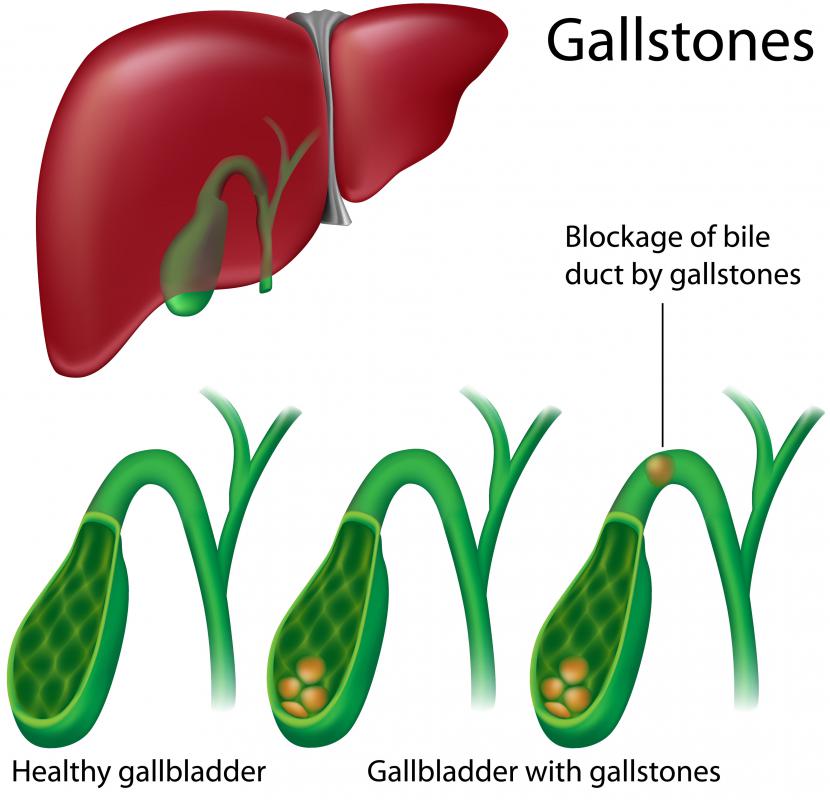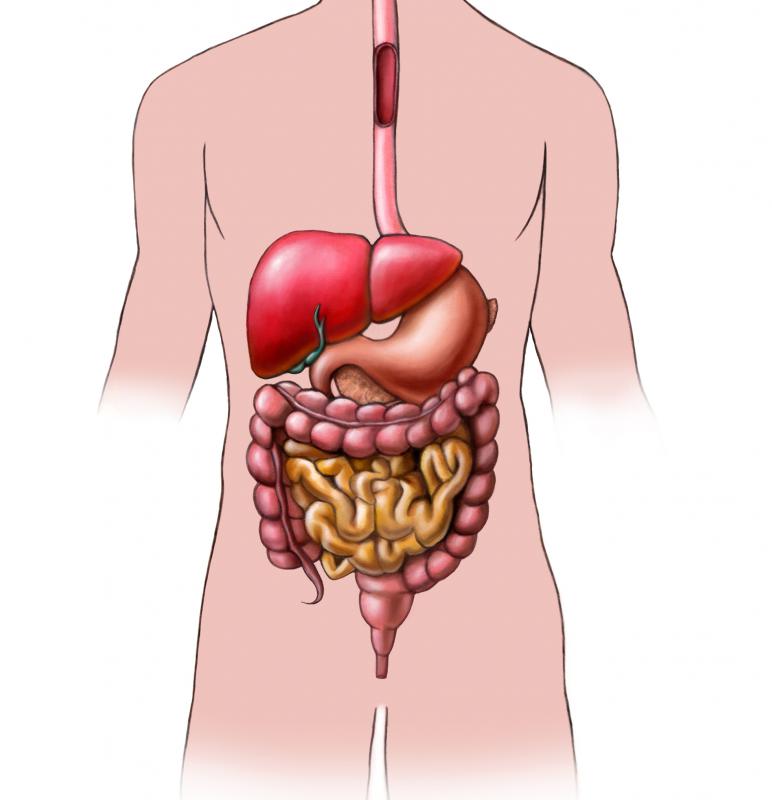At WiseGEEK, we're committed to delivering accurate, trustworthy information. Our expert-authored content is rigorously fact-checked and sourced from credible authorities. Discover how we uphold the highest standards in providing you with reliable knowledge.
What Is the Connection between the Gallbladder and Digestive System?
There is a key relationship between the gallbladder and digestive system. The gallbladder receives and stores a fluid called bile. The bile is released during digestion to assist with the breakdown of fats. Without the gallbladder, people would have a more difficult time properly digesting the fats that they consume.
Many people don’t readily recognize the link between the gallbladder and digestive system. This small, teardrop-shaped organ is only about 3 inches (around 8 cm) long and lies in the upper right quadrant of the abdomen, below the ribs and behind the liver. Still, it has an important role to play.

The gallbladder is connected to the liver and small intestine by certain tubelike channels called ducts. The liver has the job of clearing toxins from the bloodstream. The resulting by-product of the liver’s toxin-cleansing and filtering process is a substance called bile. Excess bile that is produced by the liver is transferred to the gallbladder through a duct, where it is then stored for later use.

It is because of this bile storage that the gallbladder and digestive system are connected. The human body needs bile to properly digest fats, but the bile as it originally enters the gallbladder contains an overabundance of substances that cut down on its efficiency. The gallbladder takes the bile that is stored within and condenses it by removing excess salt, cholesterol, water, and minerals, thus making it more effective for breaking down fat. When a person consumes foods containing fat, a message is sent to the gallbladder and digestive system, and the bile is released into the small intestine to do its job.

The gall bladder and digestive system are susceptible to various conditions and diseases that can negatively affect this process. For instance, sometimes the minerals removed from the bile crystallize and solidify within the gallbladder, forming what is known as gallstones. If the stones are large enough, they can block the bile ducts leading from the gallbladder to the small intestine or from the liver to the gallbladder, thus restricting the flow of bile. In other instances, the gallbladder itself can become infected or inflamed, which can negatively affect its ability to store and release bile.

In many instances, problems with the gallbladder can be managed by medication and nonsurgical intervention. In other cases, however, doctors might recommend that the gallbladder be removed. People can survive without this organ but must usually alter their lifestyles to compensate for the lack of a link between the gallbladder and digestive system. For instance, a patient who has had a gallbladder removed or damaged through chronic illness must constantly monitor intake of fatty foods. Further, they might be required to take certain supplements to help with the breakdown of fat during digestion.
AS FEATURED ON:
AS FEATURED ON:














Discussion Comments
@ddljohn-- That's right.
No doubt, the gallbladder plays a role in digestion but it's not as vital as other digestive organs. If it was vital, people wouldn't be able to survive after it is removed.
My sister is a doctor and she told me that one can eat fats after gallbladder removal, but not all. If the liver produces enough bile on its own to digest the fats that are consumed, there won't be digestive troubles. She recommends those without gallbladder to eat foods with healthy fats like eggs, butter and liver. She also recommends supplementing with bile salts, or bitters when necessary to aid bile production.
Of course, you should talk to your doctor about it before implementing any of these tips.
Is it true that liver produces bile as well? So the digestive system is not completely left without bile when the gallbladder doesn't function well or when it's removed?
I didn't know that there is a link between the gallbladder and the digestive system until my father had to have his removed. He was put on a strict diet afterward to avoid fatty foods and he had to take medications and an enzyme supplement as well. Despite all this, sometimes he had a lot of digestive discomfort.
The gallbladder might be a small organ but it's very important for digestion. Those who have to live without it know it well.
Post your comments